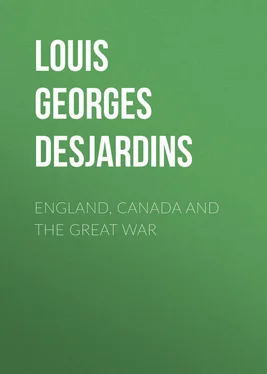Louis Desjardins - England, Canada and the Great War
Здесь есть возможность читать онлайн «Louis Desjardins - England, Canada and the Great War» — ознакомительный отрывок электронной книги совершенно бесплатно, а после прочтения отрывка купить полную версию. В некоторых случаях можно слушать аудио, скачать через торрент в формате fb2 и присутствует краткое содержание. Жанр: foreign_antique, foreign_prose, на английском языке. Описание произведения, (предисловие) а так же отзывы посетителей доступны на портале библиотеки ЛибКат.
- Название:England, Canada and the Great War
- Автор:
- Жанр:
- Год:неизвестен
- ISBN:нет данных
- Рейтинг книги:5 / 5. Голосов: 1
-
Избранное:Добавить в избранное
- Отзывы:
-
Ваша оценка:
- 100
- 1
- 2
- 3
- 4
- 5
England, Canada and the Great War: краткое содержание, описание и аннотация
Предлагаем к чтению аннотацию, описание, краткое содержание или предисловие (зависит от того, что написал сам автор книги «England, Canada and the Great War»). Если вы не нашли необходимую информацию о книге — напишите в комментариях, мы постараемся отыскать её.
England, Canada and the Great War — читать онлайн ознакомительный отрывок
Ниже представлен текст книги, разбитый по страницам. Система сохранения места последней прочитанной страницы, позволяет с удобством читать онлайн бесплатно книгу «England, Canada and the Great War», без необходимости каждый раз заново искать на чём Вы остановились. Поставьте закладку, и сможете в любой момент перейти на страницу, на которой закончили чтение.
Интервал:
Закладка:
A motion embodying the views so earnestly pressed by the British Government was unanimously carried.
On the fifth of March, 1907, only four months before the opening of the Second Hague Conference, Mr. Campbell-Bannerman, affirming the bounden duty of England to propose the restriction of armaments, said, in the British House of Commons: —
" Holding the opinion that there is a great movement of feeling among thinking people in all the nations of the world, in favor of some restraint on the enormous expenditure involved in the present system so long as it exists… We have desired and still desire to place ourselves in the very front rank of those who think that the warlike attitude of powers, as displayed by the excessive growth of armaments is a curse to Europe, and the sooner it is checked, in however moderate a degree, the better. "
Unfortunately, German hostility to reduced armaments prevented any good result from the second Hague Conference in the way of checking extravagant and ruinous military organization. There was sad disappointment in all the reasonable world and specially in England at this deplorable outcome. Mr. Campbell-Bannerman expressed it as follows: —
" We had hoped that some great advance might be made towards a common consent to arrest the wasteful and growing competition in naval and military armaments. We were disappointed. "
Unshaken in her determination to do her utmost to protect Civilization against the threatening and ever increasing dangers of German militarism, England persisted with the most laudable perseverance in her noble efforts to that much desired end. But all her pleadings, however convincing, were vain. Germany was obdurate. Finally, on the 30th of March, 1911, speaking in the Reichstag, the German Imperial Chancellor threw off the mask, and positively declared that the question of reduced armaments admitted of no possible solution " as long as men were men and States were States ."
A more brutal declaration could hardly have been made. It was a cynical challenge to the World. Times were maturing and Germany was anxiously waiting for the opportunity to strike the blow which would stagger Humanity.
Through all the great crisis of July and August, 1914, directly consequent upon the odious crime of Sarajevo, England exhausted all her efforts to maintain peace, but unfortunately without avail.
Knowing very well how much England sincerely wished the maintenance of peace, the German Government was to the last moment under the delusion that it could succeed in having Great Britain to remain neutral in a general European war. They were not ashamed to presume they could bribe England. Without blushing they made to the British Government the infamous proposition contained in the following despatch from Sir E. Goschen, the British Ambassador at Berlin, to Sir Edward Grey, the Secretary of State for Foreign Affairs: —
(Telegraphic.)
I was asked to call upon the Chancellor to-night. His Excellency had just returned from Potsdam.
He said that should Austria be attacked by Russia a European conflagration might, he feared, become inevitable, owing to Germany's obligation as Austria's ally, in spite of his continued efforts to maintain peace. He then proceeded to make the following strong bid for British neutrality. He said that it was clear, so far as he was able to judge the main principle which governed British policy, that Great Britain would never stand by and allow France to be crushed in any conflict there might be. That, however, was not the object at which Germany aimed. Provided that neutrality of Great Britain was certain, every assurance would be given to the British Government that the Imperial Government aimed at no territorial acquisitions at the expense of France should they prove victorious in any war that might ensue.
I questioned his Excellency about the French colonies, and he said he was unable to give a similar undertaking in that respect. As regards Holland, however, his Excellency said that, so long as Germany's adversaries respected the integrity and neutrality of the Netherlands, Germany was ready to give His Majesty's Government an assurance that she would do likewise. It depended upon the action of France what operations Germany might be forced to enter upon in Belgium, but when the war was over, Belgian integrity would be respected if she had not sided against Germany.
His Excellency ended by saying that ever since he had been Chancellor the object of his policy had been, as you were aware, to bring about an understanding with England; he trusted that these assurances might form the basis of that understanding which he so much desired. He had in mind a general neutrality agreement between England and Germany, though it was of course at the present moment too early to discuss details, and an assurance of British neutrality in the conflict which present crisis might possibly produce, would enable him to look forward to realisation of his desire.
In reply to his Excellency's inquiry how I thought his request would appeal to you, I said that I did not think it probable that at this stage of events you would care to bind yourself to any course of action and that I was of opinion that you would desire to retain full liberty.
Our conversation upon this subject having come to an end, I communicated the contents of your telegram of to-day to his Excellency, who expressed his best thanks to you.
To the foregoing outrageous proposition, the Government of Great Britain gave the proud and noble reply which follows, for all times to be recorded in diplomatic annals to the eternal honour and glory of the Ministers who incurred the responsibility of, and of the distinguished diplomat who drafted, that memorable document: —
(Telegraphic.)
Foreign Office, July 30, 1914.Your telegram of 29th July.
His Majesty's Government cannot for a moment entertain the Chancellor's proposal that they should bind themselves to neutrality on such terms.
What he asks us in effect is to engage to stand by while French colonies are taken and France is beaten so long as Germany does not take French territory as distinct from the colonies.
From the material point of view such a proposal is unacceptable, for France, without further territory in Europe being taken from her, could be so crushed as to lose her position as a Great Power, and become subordinate to German policy.
Altogether, apart from that, it would be a disgrace for us to make this bargain with Germany at the expense of France, a disgrace from which the good name of this country would never recover.
The Chancellor also in effect asks us to bargain away whatever obligation or interest we have as regards the neutrality of Belgium. We could not entertain that bargain either.
Having said so much, it is unnecessary to examine whether the prospect of a future general neutrality agreement between England and Germany offered positive advantages sufficient to compensate us for tying our hands now. We must preserve our full freedom to act as circumstances may seem to us to require in any such unfavourable and regrettable development of the present crisis as the Chancellor contemplates.
You should speak to the Chancellor in the above sense, and add most earnestly that the only way of maintaining the good relations between England and Germany is that they should continue to work together to preserve the peace of Europe; if we succeed in this object, the mutual relations of Germany and England will, I believe, be ipso factoimproved and strengthened. For that object His Majesty's Government will work in that way with all sincerity and good-will.
Читать дальшеИнтервал:
Закладка:
Похожие книги на «England, Canada and the Great War»
Представляем Вашему вниманию похожие книги на «England, Canada and the Great War» списком для выбора. Мы отобрали схожую по названию и смыслу литературу в надежде предоставить читателям больше вариантов отыскать новые, интересные, ещё непрочитанные произведения.
Обсуждение, отзывы о книге «England, Canada and the Great War» и просто собственные мнения читателей. Оставьте ваши комментарии, напишите, что Вы думаете о произведении, его смысле или главных героях. Укажите что конкретно понравилось, а что нет, и почему Вы так считаете.












